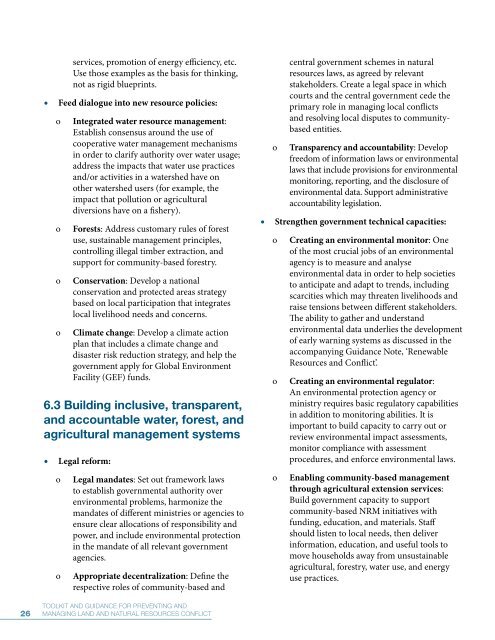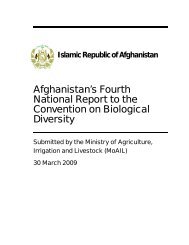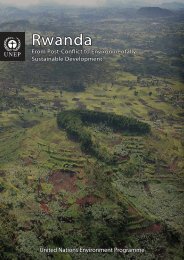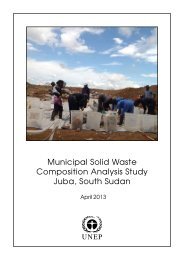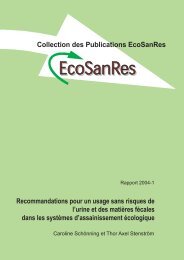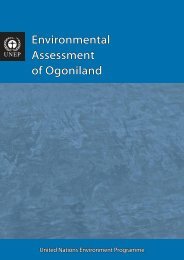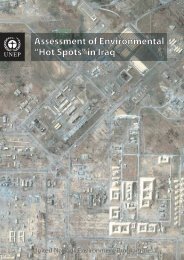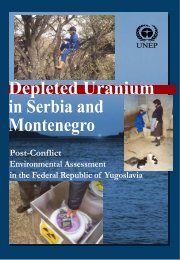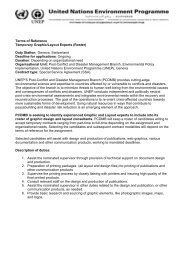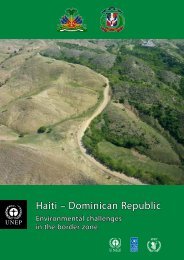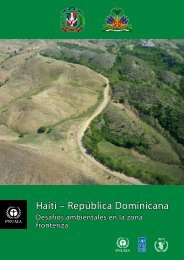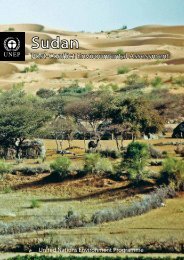Strengthening capacity - Disasters and Conflicts - UNEP
Strengthening capacity - Disasters and Conflicts - UNEP
Strengthening capacity - Disasters and Conflicts - UNEP
Create successful ePaper yourself
Turn your PDF publications into a flip-book with our unique Google optimized e-Paper software.
services, promotion of energy efficiency, etc.<br />
Use those examples as the basis for thinking,<br />
not as rigid blueprints.<br />
Feed dialogue into new resource policies:<br />
o<br />
o<br />
o<br />
o<br />
Integrated water resource management:<br />
Establish consensus around the use of<br />
cooperative water management mechanisms<br />
in order to clarify authority over water usage;<br />
address the impacts that water use practices<br />
<strong>and</strong>/or activities in a watershed have on<br />
other watershed users (for example, the<br />
impact that pollution or agricultural<br />
diversions have on a fishery).<br />
Forests: Address customary rules of forest<br />
use, sustainable management principles,<br />
controlling illegal timber extraction, <strong>and</strong><br />
support for community-based forestry.<br />
Conservation: Develop a national<br />
conservation <strong>and</strong> protected areas strategy<br />
based on local participation that integrates<br />
local livelihood needs <strong>and</strong> concerns.<br />
Climate change: Develop a climate action<br />
plan that includes a climate change <strong>and</strong><br />
disaster risk reduction strategy, <strong>and</strong> help the<br />
government apply for Global Environment<br />
Facility (GEF) funds.<br />
6.3 Building inclusive, transparent,<br />
<strong>and</strong> accountable water, forest, <strong>and</strong><br />
agricultural management systems<br />
Legal reform:<br />
o<br />
o<br />
Legal m<strong>and</strong>ates: Set out framework laws<br />
to establish governmental authority over<br />
environmental problems, harmonize the<br />
m<strong>and</strong>ates of different ministries or agencies to<br />
ensure clear allocations of responsibility <strong>and</strong><br />
power, <strong>and</strong> include environmental protection<br />
in the m<strong>and</strong>ate of all relevant government<br />
agencies.<br />
Appropriate decentralization: Define the<br />
respective roles of community-based <strong>and</strong><br />
o<br />
central government schemes in natural<br />
resources laws, as agreed by relevant<br />
stakeholders. Create a legal space in which<br />
courts <strong>and</strong> the central government cede the<br />
primary role in managing local conflicts<br />
<strong>and</strong> resolving local disputes to communitybased<br />
entities.<br />
Transparency <strong>and</strong> accountability: Develop<br />
freedom of information laws or environmental<br />
laws that include provisions for environmental<br />
monitoring, reporting, <strong>and</strong> the disclosure of<br />
environmental data. Support administrative<br />
accountability legislation.<br />
Strengthen government technical capacities:<br />
o<br />
o<br />
o<br />
Creating an environmental monitor: One<br />
of the most crucial jobs of an environmental<br />
agency is to measure <strong>and</strong> analyse<br />
environmental data in order to help societies<br />
to anticipate <strong>and</strong> adapt to trends, including<br />
scarcities which may threaten livelihoods <strong>and</strong><br />
raise tensions between different stakeholders.<br />
The ability to gather <strong>and</strong> underst<strong>and</strong><br />
environmental data underlies the development<br />
of early warning systems as discussed in the<br />
accompanying Guidance Note, ‘Renewable<br />
Resources <strong>and</strong> Conflict’.<br />
Creating an environmental regulator:<br />
An environmental protection agency or<br />
ministry requires basic regulatory capabilities<br />
in addition to monitoring abilities. It is<br />
important to build <strong>capacity</strong> to carry out or<br />
review environmental impact assessments,<br />
monitor compliance with assessment<br />
procedures, <strong>and</strong> enforce environmental laws.<br />
Enabling community-based management<br />
through agricultural extension services:<br />
Build government <strong>capacity</strong> to support<br />
community-based NRM initiatives with<br />
funding, education, <strong>and</strong> materials. Staff<br />
should listen to local needs, then deliver<br />
information, education, <strong>and</strong> useful tools to<br />
move households away from unsustainable<br />
agricultural, forestry, water use, <strong>and</strong> energy<br />
use practices.<br />
26<br />
TOOLKIT AND GUIDANCE FOR PREVENTING AND<br />
MANAGING LAND AND NATURAL RESOURCES CONFLICT


